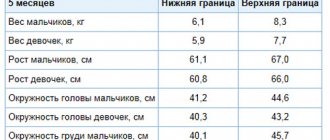To monitor the physical development of a child, it is necessary to focus on general normative indicators, checking how much he weighs and whether such weight is normal. At 3 months, babies should weigh between 5.2 and 5.6 kg. Up to 4 months, a child can gain up to 0.8 kg. At the same time, a normal height for children at 3 months is considered to be from 54 to 56 cm.
Depending on the configuration and gender, weight indicators at this age may vary. Therefore, if a child weighs from 3 to 6 kg, this does not always mean that he has some health problems. Girls are usually born smaller than boys. To find out whether the baby has gained the desired weight after reaching three months, you should proceed from the following pattern:
- if the weight of a newborn boy is 3.2 kg, then at 3 months he should weigh 5.2 kg;
- If a newborn girl weighs 3 kg, then at 3 months she needs to weigh 4.8 kg.
Since the digestive system changes at the age of three months, the baby may appear some characteristic external signs: rounded cheeks and belly, folds on the arms and legs. Also at this age there is a change in proportionality. If in newborns the head seems too big, then after three months the chest should expand. If the head still remains disproportionately large, you should consult a doctor, regardless of how much the child weighs.
Baby's weight at 3 months
Naturally, the numbers are conditional and are the average statistical indicator for children aged three months, but it is worth focusing on them, since you can independently assess the situation. Today, according to pediatricians, the weight of a child at 3 months can range from three to six kilograms.
The baby’s weight, as well as his height, depends on many factors:
- infant indicators at birth;
- genetic aspect;
- type of nutrition - natural or artificial;
- the presence of certain pathologies.
The World Health Organization has recorded and approved the weight and height of three-month-old babies. So, how much should a baby weigh at 3 months:
For boys:
- 5.1-5.6 kg – lower limits of normal;
- 5.6-7.2 kg – average figures;
- 7.2-7.9 kg – above average parameters.
For girls:
- 4.6-5.1 kg – lower weight values;
- 5.1-6.7 kg – average norm;
- 6.7-7.4 kg – weight values are above average.
That is why the weight norm at 3 months is different for each baby. A pediatrician can make a conclusion about underweight or excess weight after examining the baby.
Baby growth at 3 months
The height of a child at 3 months can be from 54-64 cm. The determining factors of growth parameters are genetics and height at birth. Less often it is associated with health problems.
It is also worth noting that height, as well as weight characteristics, will differ between boys and girls: girls have a fragile constitution from birth.
As for growth rates at three months, its norms can also be studied using the figures provided by WHO:
Girls height:
- 55.8-57.6 cm – below average height;
- 57.6-62.0 cm – average parameters;
- 62.0 -63.8 cm – tall height of the baby.
Boys height:
- 57.6-59.3 cm – lower limits of growth;
- 59.3-63.5 cm – average;
- 63.5 – 65.3 cm – tall baby height.
Despite the fact that all these data are approximate, 94% of children have such parameters. If a child was born premature, then already at 40 weeks he catches up with his peers in height and weight. In some cases, premature infants level out in terms of physical development closer to a year.
What should a 3 month old baby be able to do?
Parents need to pay attention to what a child should be able to do at 3 months:
- If a three-month-old baby is placed on his stomach, he stretches his arms forward. This will create a right angle at the elbow joint. This is how gross motor skills develop—the motor activity of large muscles.
- Lying on his stomach, the child can raise his head, fixing it on his weight and leaning on his forearms.
- The physical development of a child at 3 months continues to improve. Now the baby, lying on his back, turns over onto his side without assistance.
- If a newborn is pulled by the arms, he will bend his legs at the knee joints and pull them towards his stomach.
At the end of the third month, reflex abilities such as automatic walking will disappear.
The toy encourages the baby to raise his head while lying on his stomach. Play with your newborn more often, showing bright objects, this will stimulate the visual system and have a positive effect on brain activity.
- At rest, the child's palm is in an open position.
- The baby can grab the toy with his hand and hold it for a while. This indicates the development of fine motor skills, when synchronization of hands and fingers with the eyes occurs.
- When playing with a child, you can notice how he follows the movement of the toy, turning his head or focusing only his eyes.
- The baby examines his hands and fingers and monitors their mobility.
- Fixes his gaze on his mother after a voice call.
- The sounds pronounced by the baby become intonationally expressive.
- One can note the appearance of syllable combinations that differ from each other depending on the mood.
- The sounds become more varied and longer: “aaahhh”, “ooohhh”. New letters are added, you can hear “N”, “M”, “P”.
- When the child sees a face, he smiles, but is not yet able to distinguish between strangers and his own.
- When communicating with his mother, he perks up, becomes active, and laughs.
- Joy, curiosity, as well as anger and frustration can be clearly expressed by a three-month-old baby. The brain increases in volume: awareness grows, simple associative abilities appear.
The baby is more interested in his surroundings and tries to communicate. He looks attentively at his mother when feeding and turns around when they talk to him. He tries to communicate with his surroundings through different sounds and knows how to express joy, for example, by squealing or laughing. Between 3 and 4 months of life, a pediatrician must be examined to ensure there are no abnormalities. In addition, the doctor will explain what a child should be able to do at 3 months of age. If violations are detected, the doctor will prescribe an appropriate set of exercises or additional diagnostic measures.
Baby skills characteristic of the third month of life
A child at the age of three months becomes mobile, his body straightens, and the baby no longer takes the fetal position - he likes to swing his arms and legs freely. [1]
Baby skills at three months:
- recognizes parents, quickly responds to mother’s voice, the desire to communicate increases;
- whines, is capricious, screams in case of dissatisfaction;
- actively plays with toys above the crib, grabs them, tries to hold them in his hands;
- if you lift the baby, it will try to rest against a hard surface;
- makes active turns of the head, holding it in weight;
- identifies sound and light sources.
The baby's development continues actively at 3 months; he begins to better recognize bright colors. Now he can see objects clearly even at great distances. Binocular vision develops: information from both eyes merges into one.
At three months old, a baby's taste buds are well developed. The baby loves everything that has a pleasant taste and sweet smell. It is noteworthy that a mother’s breast milk changes in the first months of a baby’s life. It adapts to the higher energy needs of a three month old baby and contains more sugar compounds.
Research shows that children whose parents interact with them have higher IQs and larger vocabularies when they get older than other children. Therefore, close interaction with the newborn during this period is especially important.
Child growth at 3 months - weight and height norms
Child growth at 3 months according to pediatricians:
- Boys: the lower limit is 56.5 cm, the upper limit is 62.1 cm.
- Girls: the lower limit is 56.1 cm, the upper limit is 61.9 cm.
Child growth according to WHO:
- Boys: the lower limit is 57.2 cm, the upper limit is 65.3 cm.
- Girls: the lower limit is 55.4 cm, the upper limit is 63.9 cm.
It should be noted that WHO regularly reviews its standards so as not to miss important points. We recommend focusing on the table data from the official website.
How much should a baby weigh at 3 months?
How much a child should weigh at 3 months is indicated by data from WHO and domestic pediatricians. So, according to WHO, the weight of boys can vary from 5 to 8 kg, which is the norm, and the weight of girls is from 4.4 to 7.6 kg. [2]
According to pediatricians, the weight of boys at 3 months ranges from 4.8 to 7.1 kg. Girls can weigh between 4.6 and 6.2 kg.
Causes of underweight
Mothers most often refer to the fact that the baby does not have enough breast milk. But in fact, a woman’s body produces as much milk as the baby needs. An exception may be cases when the mother has practically no milk due to a difficult birth or other health problems.
Mom should watch the feeding schedule: if the baby asks for the breast less often than once every three hours, there may be a need for more frequent breastfeeding.
Among the reasons for a child's low weight may be an anatomical feature of the baby, for example, a short frenulum of the tongue. This can become an irritant and cause your baby to eat less.
One cannot help but remember the psychological aspect, since underweight can be a reflection of anxiety and psychosis. The baby feels the mother’s condition, so it is important for the woman to remain optimistic, and if there are serious problems, consult a doctor.
Underweight
Once you know how much your child weighs, you can identify any abnormalities. If his weight is less than normal, most likely you are not feeding your baby. This often happens because the mother does not have enough milk. Every day, babies at this age should be given milk in an amount equal to a sixth of their weight. If there is a lack of milk, you should consult a doctor who will recommend a suitable formula for feeding.
Children may be underweight due to illness. If children are underweight, the following symptoms may appear at 3 months:
- The child refuses to eat.
- It is difficult for him to breathe through his nose, so he inhales air through his mouth.
- He can't latch on.
If you notice such signs, your baby probably has a disease associated with inflammation of the mucous membranes (or nose, or mouth). In this case, you cannot force feed. It is better to feed him in small portions, but more often. The baby should be given exactly as much milk as he requires. If the baby refuses to eat, it means he is full.
Weight loss occurs due to a lack of zinc in the body. Some children, even at the developmental stage, while in the womb, receive insufficient amounts of nutrients, which subsequently affects their weight. In this case, he should receive a complex of zinc-based minerals along with food.
What to do if a three-month-old baby is underweight?
- Find out whether the baby has enough nutrition. To determine whether the baby is getting the proper amount of nutrition, pediatricians advise monitoring the frequency of his urination. If you change diapers at least ten times during the day, then the baby does not need to be supplemented. If he urinates less often, then there is a possibility that the baby is not getting enough nutrition. Then the mother should take action as quickly as possible.
- Establish breastfeeding. A sufficient amount of fluid and a balanced diet are what, above all, a mother needs. Express breast milk when absolutely necessary; the baby must empty the breast. If you express milk shortly before feeding, it may not have time to arrive, and then the baby will not be satisfied. You need to breastfeed your baby at his request. The slightest signs of anxiety are a sure signal that it’s time to breastfeed. Don't wait for a hungry baby to cry.
- Supplement feeding the baby. Pediatricians recommend supplementing underweight children with special formulas. As a rule, this brings good results.
- Make milk consumption easier. It is easier to suck milk from a bottle than from the breast. Therefore, a mother who decides not to switch to mixed feeding can give her baby expressed breast milk from a bottle. Sometimes this method bears fruit - the baby eats better.
- Have your child examined by appropriate doctors. If the baby is supplemented with food, and he still gains very little weight, you need to contact your pediatrician, then conduct an examination for the presence of pathology. It is likely that there are parasites in the child's body. Sometimes babies lose weight due to a lack of the enzyme lactase, which breaks down milk sugar. The problem can be solved if you start taking Lactase-Baby after consulting with your pediatrician.
Nutritional standards for a 3-month-old baby
If the baby's weight is low, the mother begins to worry, which necessarily affects lactation. In order for weight gain to be normal, the baby must receive complete and high-quality nutrition. If a mother understands how much liquid her baby consumes at a time and how much food he should receive, she can easily establish proper nutrition.
The norm for feeding a child once at 3 months is approximately 150-180 ml of breast milk (formula).
If the baby’s weight does not meet the norms, then parents must, first of all, determine the reason for this state of affairs and try to eliminate it. The problem of underweight is easy to fix, so don’t panic.
Experienced pediatricians believe: a child’s weight at 3 months determines his later health. It’s bad when the indicators are below normal. Exceeding the upper limit of the weight norm can also lead to negative consequences.
Obesity
Many children weigh more than the established norm at 3 months. Finding out how much your baby weighs can help you determine if he is obese. If he has gained more than 15 percent of the required norm and has large folds of fat, this indicates obesity.
Typically, this problem occurs due to overfeeding. But the cause may also be an endocrine disease or genetic predisposition. Obesity at this age is fraught with negative health consequences (the development of diabetes, diseases of the digestive tract, dysfunction of the genital organs). Therefore, if you encounter such a problem, you should immediately consult a doctor.











